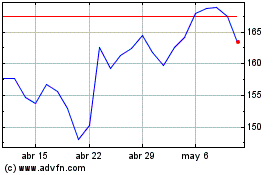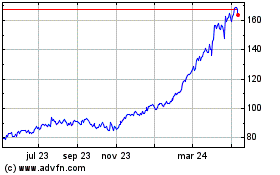By David Benoit
This article is being republished as part of our daily
reproduction of WSJ.com articles that also appeared in the U.S.
print edition of The Wall Street Journal (January 31, 2019).
Accounting giant KPMG LLP has been blessing the books of General
Electric Co. for 110 years, but the audit currently under way holds
significant risks for both companies.
KPMG is under fire for a string of audit failures and scandals,
highlighted again Friday in a set of scathing reports by the
nation's top accounting regulator, which is demanding KPMG increase
its skepticism and improve the quality of work, particularly at
big, complicated clients like GE.
A tough audit is the last thing GE needs right now. Investors
have already been concerned about more unknowns bubbling up. The
conglomerate is trying to increase cash, pare debt and return to
growth. More bad news could hamper those efforts or provide
evidence for investigators from the Securities and Exchange
Commission and the Justice Department, which are probing GE's
accounting decisions.
GE is set to release its fourth-quarter numbers on Thursday. As
with most quarterly earnings, those numbers won't be officially
audited. But, in one of the biggest and most lucrative audits of
any company, hundreds of KPMG partners and staff are poring over
GE's books in preparation for the company's annual audited results,
likely released in late February.
KPMG hasn't been named in the GE investigations, but the Public
Company Accounting Oversight Board, or PCAOB, released several
reports Friday calling into question KPMG's work on similar
issues.
The reports said PCAOB found problems in nearly half of the 103
KPMG audits it inspected from 2016 and 2017 and said improvements
it ordered in prior years hadn't been made. The regulator also
disclosed new details on the impact of leaks from the PCAOB about
what audits would be reviewed, which helped KPMG prepare for the
annual inspections.
KPMG said in a letter to PCAOB that it has taken significant
steps, including management and board changes, to improve its
processes.
A spokesman said it couldn't comment on GE specifically but that
"We are confident that our audits and reviews were appropriately
performed in accordance with applicable professional standards, and
we stand behind our work."
The PCAOB reports don't name specific clients of the auditor,
and it wasn't clear if the regulator had inspected or found any
issues with KPMG's work related to GE, which said it doesn't
believe its audit is involved.
But the reports criticize how KPMG policed its clients over the
accounting questions that are central to the GE probes: How did GE
decide when to book revenue and how to value assets, and why were
the assumptions behind those decisions too optimistic?
GE has said it is cooperating with the probes and that it hasn't
found evidence of wrongdoing. The company said it would consider
new auditors for 2020.
GE has said the government investigators are looking at how it
booked revenue from service contracts in its power business, which
builds turbines used by electricity generators and sells longtime
contracts to service them.
In the PCAOB reports, the most frequent area of trouble was
KPMG's work on how clients decided to book revenue, which came up
18 times in 103 audits.
The investigators are also looking at a $22 billion write-down
GE took on its 2015 acquisition of French company Alstom's power
business.
The PCAOB four times faulted KPMG for the work it did while
checking clients' assumptions when assigning value to acquired
assets.
In another thread of the auditing probes, GE is facing scrutiny
over a $15 billion increase to its reserves for long-term care
insurance policies, which cover care like nursing homes and proved
more expensive than much of the industry expected. GE has said the
need for more reserves was discovered following a sudden spike in
claims that differed from historical trends.
In the 2017 report, the PCAOB cited KPMG for failing to
adequately test an insurance client's use of historical data to
estimate future insurance claims.
For KPMG, the report was the latest blow to its reputation amid
many scandals, including the leak from the PCAOB about audit
reviews. Three people, including a former KPMG partner, have
pleaded guilty to criminal charges; two other former partners still
face charges.
The regulator said that leak led to a review of 10 new KPMG
audits from 2016. The inspections turned up problems in nine of
those audits.
No matter what happens with the SEC and Justice Department
investigations or the current audit, KPMG's bottom line is already
likely to take a hit.
GE paid KPMG $142.9 million in 2017, the biggest total audit fee
for any company regulated by the SEC, according to Audit Analytics.
The fee was higher than in recent years due to work done on GE's
efforts to break off assets. GE has been one of the 10 most
lucrative audits in each of the past five years, Audit Analytics
data said.
The GE audit was so important to KPMG that roughly 400 partners
worked on it last year, according to GE's financial disclosures.
But the importance of GE to KPMG raised questions among investors
about auditor independence, and whether the accounting firm would
stand up to GE's aggressive accounting maneuvers.
The pressure was clear inside KPMG, where people who worked
there said a well-known phrase among executives was, "you don't
want to be the partner who lost the GE account."
Thomas Gryta contributed to this article.
Write to David Benoit at david.benoit@wsj.com
(END) Dow Jones Newswires
January 31, 2019 02:47 ET (07:47 GMT)
Copyright (c) 2019 Dow Jones & Company, Inc.
GE Aerospace (NYSE:GE)
Gráfica de Acción Histórica
De Mar 2024 a Abr 2024

GE Aerospace (NYSE:GE)
Gráfica de Acción Histórica
De Abr 2023 a Abr 2024
